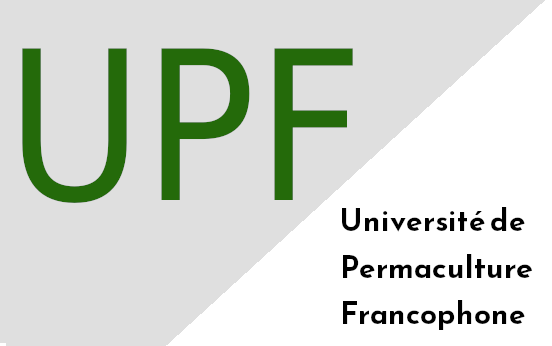We’re fully into the process of setting up the Université de Permaculture Francophone (UPF), why?
Every element in a system should have more than one function
Hello! We’re here :-)
Permaculture was put into place by two English speakers, the first books, lectures, films, etc were all in English. This is completely normal, what wouldn’t be correct is that this linguistic dominance should come to eclipse all that is happening in the Perma-verse in other languages and cultures.
Here in France, we have noticed that this is somewhat the case. Over the years we have had tourist teachers flying who arrive thinking that they will find a barren landscape bereft of any Permaculture. We have also had people coming back from overseas design courses where they were told to ‘go back and teach because there is nothing there’. I can understand that if you could have this opinion if you don’t speak French and don’t take the time to see if anything is going on in France. The trouble is that the opposite is true and the Perma-ecosystem here is in place, it works and all is fine.
One reason, then, for the UPF, and not at all the most important one is to send a signal to the English-speaking world. Hi! We’re here and we’re fine.
A spade isn’t a shovel
We see a things that aren’t Permaculture being sold as such. People can, too often, conflate Permaculture with something else. This is happening with the Syntropic agriculture movement, the Syntropic approach is an agricultural strategy that may, or may not, be useful in certain designs. It isn’t, in itself, Permaculture, it is another strategy amongst many others that we can use if the context is right.
Resource sharing
English is the major international language so sometimes English speakers forget that billions of people don’t speak it. French is the second most taught language in the world, there are about 327 million French speakers worldwide. 60% of them are in Africa.
Automatic translators are quite advanced now but languages are not all constructed in the same way. A sentence translated online can give the opposite meaning to the original. This happens regularly to me when I auto-translate my Substack articles. A French speaker will often struggle to understand a sentence basically because it doesn’t make sense in French.
There are quite a number of books and other resources now in French and one of the missions of the UPF is to make them widely available in the French-speaking world.
Here in France, we have spent a lot of time setting up things like the Diploma system, we can now share our experiences through the UPF network. People in other countries can look at what we’ve done and reject it or adapt it to their needs and cultures.
Bilateral flows
French people know that there are many other French-speaking countries. They can, however, have a sort of cultural myopia and have a mental world map that places France at the centre. This happens within France itself, Paris is the ‘centre’, and everywhere else is the ‘provinces’. We’ve been working to change this for some time. The UPF is designed to give an equal voice to everyone and to encourage bilateral flows. This is crucial as the planet lurches into unknown and rising waters, we need to learn from each other. A lot of recent innovation has been coming from African countries and we Europeans are also learning a lot from traditional East African techniques. The dark earths of East Africa are an example, as are Zaï.
Avoid centralisation
I recently wrote an article about how we continually give away power.
One excellent way to do this is to set up centralised distant power bases a long way from the regions they govern. Back in the early years of this century, we decided to use Permaculture to design its own evolution in France. This may seem a bit radical but to us, it seemed completely logical. The Université Populaire de Permaculture (UPP) was set up as a network of accredited designers, students and to run the Diploma system. Brin de Paille was created as an informal ‘general public’ network with an online forum and a yearly festival.
The follow-up to this was that the UPP was designed to fade away. It was to be replaced by a decentralised network of working projects that were also designed to be demonstration and learning centres (CDFP). This will be the same with the UPF.
What is the UPF going to do?
Link up people who speak the same language, French.
Promote Permaculture design in all French speaking countries teaching up designers and helping set up projects.
Ensure, as far as possible, that what is promoted as Permaculture is actually the what Permaculture is, a holistic design and engineering system.
Facilitate the free exchange of information, documents, books, podcasts etc.
Create a learning pathway that is coherent, integrated and easy to access.
How will it run?
We have put together a group of people from french speaking countries who are networking people and projects in their own countries. We are working to link these networks together.
These people are also members of the UPF administration team. We are currently discussing how to take decisions and what legal status, if any, the UPF will have. Becoming an NGO could have some advantages in terms of attracting funding. On the other hand it could lead to the UPF becoming too rigid and centralised.
There is a lot of things we are getting on with so it’s a good job we are enjoying ourselves doing it!






“From little acorns Oak trees grow” How encouraging it is to recall the infancy of Permaculture . I believe its growth is unstoppable . Bonne Fortune . Lionel
Bnjr,
Trop intéressant...
Dans notre pays RDC/région Est, la permaculture serait l'une des pistes de solutions à l'insécurité alimentaire devenue monnaie courante dans plusieurs contrées/coins d'une part et une technologie résiliente face aux effets de changements climatiques qui sévissent dans la plupart de territoires.